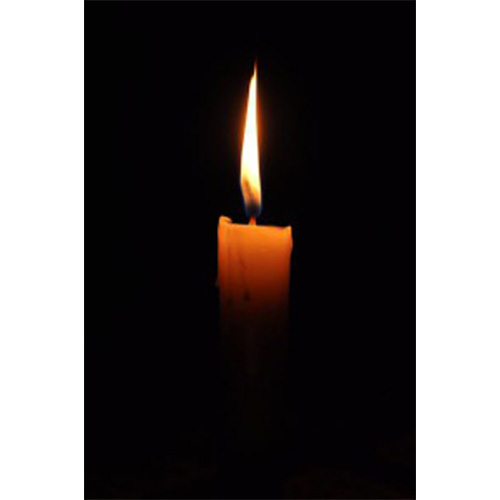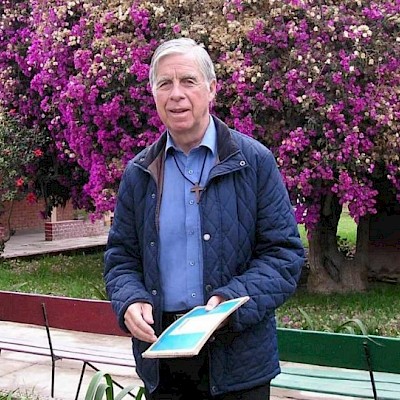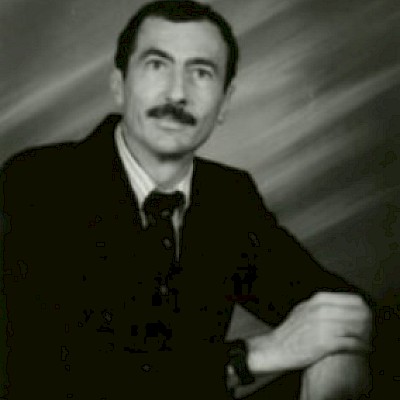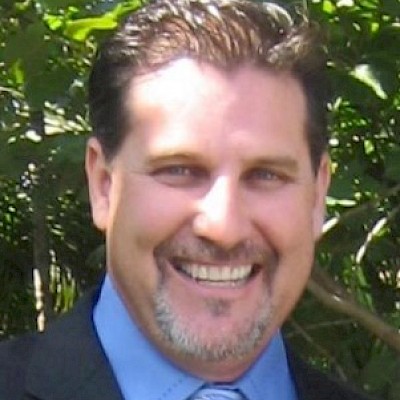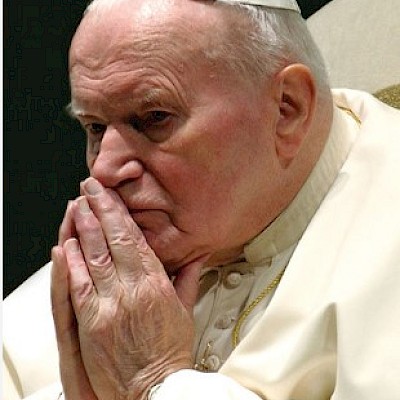VATICAN CITY, Sunday, April 3 - Pope John Paul II died Saturday night, succumbing finally to years of illness endured painfully and publicly, ending an extraordinary, if sometimes polarizing, 26-year reign that remade the papacy.
He died at 9:37 p.m. in his apartment three stories above St. Peter's Square, as tens of thousands of the faithful gathered within sight of his lighted window for a second night of vigils, amid millions of prayers for him from Roman Catholics around the world as his health declined rapidly.
People wept and knelt on cobblestones as the news of his death spread across the square, bowing their heads to a man whose long and down-to-earth papacy was the only one that many young and middle-aged Catholics around the world remembered. For more than 10 minutes, not long after his death was announced, the largely Roman crowd simply applauded him.
"I have looked up to this man as a guide, and now it is like a star that has suddenly disappeared," said Caeser Aturi, 38, a priest from Ghana, which the widely traveled pope visited in 1980, on a continent where the Roman Catholic church grew sizably under his reign.
He was born Karol Wojtyla on May 18, 1920 in Wadowice, Poland. He was 84 years old.
Hospitalized twice since Feb. 1 and suffering for a decade from Parkinson's disease, John Paul's health hit its last crisis on Thursday, when the Vatican announced that a urinary tract infection had caused a high fever and unstable blood pressure.
In the next day, his kidneys and cardio-respiratory system began to fail. On Saturday morning, his chief spokesman, Dr. Joaquín Navarro-Valls, announced grimly that the Pope had begun to fade from consciousness.
His last hours were spent, Dr. Navarro-Valls said in a statement early on Sunday, by "the uninterrupted prayer of all those who surrounded him." At 8 p.m. Mass was celebrated in his room, the statement said, and he was administered the final Catholic rite for the sick and dying for the second time, having already received it on Thursday.
He was surrounded at his death by a close circle of aides from Poland: his two personal secretaries, Archbishop Stanislaw Dziwisz and Monsignor Mieczyslaw Mokrzycki; Cardinal Marian Jaworski, Archbishop Stanislaw Rylko; the Rev. Tadeusz Styczen, as well as three Polish nuns who have long worked in his residence. His personal doctor, Renato Buzzonetti, two other doctors and two nurses were also there.
After a doctor certifies his death, tradition calls for the Vatican camerlengo, Cardinal Eduardo Martinez Somalo, who will run the Vatican until a new pope is chosen, to call out his baptismal name three times. He then strikes the pope's forehead with a silver hammer to ensure he is dead. The hammer is then used to destroy the papal ring, the symbol of his authority.
In the last few weeks before his death, he deteriorated to the point where he seemed, as his spokesman once said, to be "a soul pulling a body" -- an example, his supporters said, of the dignity of old age and the value of suffering. Some critics said it was a symbol of a papacy in need of rejuvenation.
In his last public appearance, from his window on Wednesday, he looked weak and gaunt, unable to pronounce a blessing to the crowd. Still recovering from a tracheotomy on Feb. 24, a pope known for his great ability as a communicator could hardly speak.
From his home country of Poland, to Africa, Asia and Latin America, world leaders and ordinary people alike reacted both in sorrow and some relief that the pope's long suffering had finally ended. There are more than a billion Roman Catholics worldwide.
"The world has lost a champion of human freedom and a good and faithful servant of God has been called home," President Bush said at the White House. "Pope John Paul II was himself an inspiration to millions of Americans and to so many more throughout the world."
In 1978, he came to office as a fit and handsome 58-year-old, blessed with a charisma, intellectual vigor and energy that took him to 129 foreign countries as the pulse of the Catholic Church moved away from an increasingly secular Europe to Africa, Asia and Latin America.
He served either the second or third longest of any pope, depending who did the counting, in the nearly 2,000-year history of the papacy.
A Pole chosen as the first non-Italian pope in 455 years, he transformed the papacy into a television-ready voice for peace, war and life, from the womb to the wheelchair. He also reached beyond religion into human rights and politics, encouraging his fellow Poles and other Europeans to reject Communism. Many historians say he deserves part of the credit for the subsequent collapse of the Soviet Union.
Even as his own voice faded away, his views on the sanctity of all human life echoed unambiguously among Catholics and Christian evangelicals in the United States on issues from abortion to the end of life. He died just two days after Terri Ann Schiavo, the brain-damaged Florida woman whose supporters cited the pope's teachings in long court battles with her husband, who won the right to remove her feeding tube. On Wednesday, the pope was himself fitted with a nasal feeding tube.
"This pope will have a place in history," Giancarlo Zizola, an Italian Vatican expert, said Saturday after his death. "Not just for what he is glorified for now, for attracting the great masses, as a sporty pope -- this won't last. Not even the fall of Berlin Wall, the defeat of communism, because he himself said it would destroy itself.
"But he will be remembered for the seeds he laid," he added. "He will be remembered for his great favoring of dialogue between different religions, for the culture of peace, and the courage to speak against wars. For having saved the values of the West from the West itself. And the human form he gave to the papacy. It is not negative or positive: it is a complete pontificate."
John Paul's detractors were often as passionate as his supporters, criticizing him for what they said was tradition-bound papacy in need of a bolder connection with modern life if the church wanted to bring back to the faith people in more secular Western nations.
"The situation in the Catholic Church is serious," Hans Kung, the eminent Swiss theologian, who was barred by the pope from teaching in Catholic schools because of his liberal views, wrote last week in an open letter to several European newspapers. "The pope is gravely ill and deserves every compassion. But the church has to live."
"In my opinion, he is not the greatest pope but the most contradictory of the 20th century," he added. "A pope of many, great gifts, and of many bad decisions."
Among liberal Catholics, he was criticized for his strong opposition to abortion, homosexuality and contraception, as well as the ordination of women and married men.
Though he was never known as a strong administrator of the dense Vatican bureaucracy, he kept a centralizing hand on the selection of bishops around the world and enforced a rigid adherence to many basic church teachings among the clergy and Catholic theologians like Dr. Kung.
But he defied easy definition: For all his conservatism on social and theological issues, he was decidedly forward looking -- too much so even for some cardinals -- on the delicate question of other religions.
While never veering from his belief that Jesus Christ alone was capable saving the souls of human beings, he reached out tirelessly to other faiths, becoming the first pope to set foot in a synagogue, in Rome in 1986, as well as in a mosque, in Damascus, Syria, in 2001.
And, as attention turned to who might be the next the pope -- would he be old or young; conservative or liberal; Italian, South American or African? -- most experts said John Paul-like charisma would no longer be optional. He was a most public man: traveling, bear-hugging, chatting and preaching the value of love with a warmth that belied his often-doctrinaire positions on church issues.
"He came across in some ways as a regular guy," said Michael Walsh, a British biographer of the pope and a former Jesuit priest. "Famous for looking at his watch. What pope looks at his watch? In Britain we're proud that he used to wear Doc Martin boots. He would watch football, drink a glass of wine."
